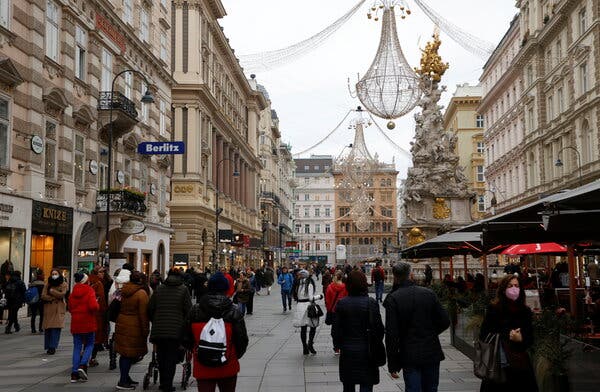Austria will go into a nationwide lockdown on Monday and impose a coronavirus vaccination mandate in February, Chancellor Alexander Schallenberg said on Friday. It is the first such lockdown in a European nation since the spring, and the first national vaccine mandate on the continent.
“Nobody wants a lockdown — the lockdown is the very last resort, a crude instrument,” Health Minister Wolfgang Mückstein said. “A lockdown is always an imposition, but it is the most reliable instrument we have to break this fourth wave.”
The measures, reminiscent of those that European nations put in place before Covid vaccines were available, follow other recent restrictions that have done little to lower the rate of infection.
In a sign of soaring worry over the latest outbreak, Austria just days ago went a step further than most countries by announcing a lockdown on unvaccinated people. Requiring people to be vaccinated against Covid starting on Feb. 1 broke new ground again.
“For a long time, the political consensus has been that we do not want compulsory vaccinations in this country,” Mr. Schallenberg said when announcing the new measures. “But we have to face reality.”
Austria has one of Europe’s highest national infection rates — with 14,212 new coronavirus cases registered in 24 hours on Thursday — and one of the lowest vaccination rates in Western Europe. Just 66 percent of the country’s population is fully inoculated.
Under the new lockdown, most aspects of public life will be suspended for at least 10 days. The measure will affect both vaccinated and unvaccinated people.
People will be allowed to leave their homes only for vital purposes such as shopping for groceries, going to work or getting a basic level of exercise. Only supermarkets and stores selling essentials will be allowed to remain open.
The lockdown for unvaccinated people will remain in place after the full lockdown expires, Mr. Schallenberg said.
Cambodia reopened for fully vaccinated tourists from overseas this week without quarantine after a nationwide campaign succeeded in achieving one of the world’s highest vaccination rates.
The move was welcomed by desperate tourism operators and workers, who have struggled to make a living since the start of the pandemic.
“I rejoice at and fully support the news of reopening the country to vaccinated tourists without quarantine,” said Chhay Sivlin, the president of the Cambodia Association of Travel Agents. Tourism directly accounted for more than 12 percent of the country’s economy in 2019 and provided jobs to 630,000 people, she said.
Last month, the Southeast Asian nation of about 16 million announced plans to let fully vaccinated foreign tourists begin entering the country at the end of November if they first quarantined in selected areas for five days.
But citing the rapid pace of inoculations and a vaccination rate of 88 percent, Prime Minister Hun Sen accelerated that plan and said that fully vaccinated tourists could arrive without quarantine, effective on Monday.
“This is a big step towards reopening the entire country,” said Mr. Hun Sen, an authoritarian leader who came to power in 1984. “I hope our compatriots enjoy our reopening. It is widely due to the country having achieved such an outstanding rate of vaccination.”
While the prime minister put the fully vaccinated rate at 88 percent based on a population of 16 million, The New York Times database puts the rate at 80 percent, based on a population of nearly 16.5 million.
More than two million people have received a third dose.
About 90 percent of Cambodia’s vaccines came from China, including more than nine million doses of Sinovac and nearly four million doses of Sinopharm.
Under the new rules, travelers arriving from abroad can skip quarantine if they are fully vaccinated, test negative for the virus before departure and test negative again on arrival. Travelers who are not vaccinated must still spend 14 days in quarantine.
Ms. Sivlin said that tourist bookings were beginning to pick up and that airlines were working to increase the number of flights to Cambodia.
Some flights are scheduled to the capital, Phnom Penh, but none for Siem Reap, the town near the ancient city of Angkor that is one of the most popular destinations in Southeast Asia.
Like many of its neighbors, Cambodia reported relatively few virus cases in 2020 but faced a deadly surge this year. Still, its overall numbers have remained relatively low, with about 120,000 total cases and 2,900 deaths.
A court in a southern Chinese border region said this week that it had given a man a two-year suspended prison sentence for lying when he entered the country about whether he had been exposed to the coronavirus or developed symptoms.
The move is the latest sign of China’s efforts to chase full elimination of the virus through stringent “Covid zero” measures, even as the rest of the world looks to open up.
The man, who was identified only by his surname, Cao, was convicted of lying on a health declaration form when he crossed China’s border with Vietnam in late April, the court said on its Weixin social media account.
He concealed that he had been staying in a hotel in Vietnam where some people with coronavirus infections were also staying, the court said. Then he obtained cold medicine and hid a fever and other symptoms consistent with a coronavirus infection.
Once in China, he also sneaked out of his quarantine room to meet friends, the court said. Mr. Cao could not be reached for comment.
The court in Pingxiang, along the Vietnam border in China’s Guangxi region, posted the announcement to its Weixin account on Wednesday. It said it had fined Mr. Cao $31,000.
The court statement and a report by the official Xinhua news agency said that Mr. Cao had symptoms consistent with the coronavirus, but did not say whether he had tested positive for the disease. Huang Qinmei, the deputy mayor of Chongzuo, the city of which Pingxiang is part, said at a news conference in May that Mr. Cao had tested positive.
Because Mr. Cao concealed information about his Covid exposure and apparent symptoms, the court said, 459 people who came in direct or indirect contact with him were also quarantined at a cost to the government of about $100,000. Another 29 customs staff members had to stay in their homes for 14 days.
Some social media users posted comments on the Xinhua report contending that the punishment was not harsh enough.
Li You contributed research.



















